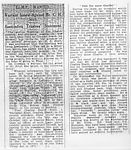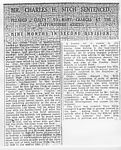 Warrant - County Express 4.3.1933
Warrant - County Express 4.3.1933 Trial - County Express 1.7.1933
Trial - County Express 1.7.1933 Report of Counsel's appeal on behalf of Charles Sitch - 1.7.1933
Report of Counsel's appeal on behalf of Charles Sitch - 1.7.1933

Charles Sitch's public life came to an abrupt end in 1933. He pleaded guilty to embezzling money from the Chainmakers' and Strikers' Association (C.M.S.A.), the union which had sponsored his education at Ruskin College, Oxford, had supported his election to M.P., and for which he had worked as general secretary for over ten years. He was sentenced to nine months imprisonment. On his release he left Cradley Heath. What led a man, so committed to helping others, so well respected by all who knew him, to commit such a crime?
The County Express reported the events in some detail, extracts of which have been included in the image gallery.
The Trustees of the Chainmakers' and Strikers' Association were alerted to the fact that there was a problem, when the Annual General Meeting of the Association had to be postponed, because Charles Sitch was missing. Shortly after, a warrant was issued against Charles, for "fraudulently misapplying £5", a sum given to him by a factory collector in respect of members' union subscriptions. At 5.40 a.m. on March 4th 1933, Charles surrendered himself to the police at Old Hill Police Station. On the 25th March he was committed for trial, on a large number of charges, at the Staffordshire Assizes. He was granted bail on the surety of £350.
The trial took place in July 1933. Charles pleaded guilty to misappropriating the funds of the C.M.S.A., over a period from 1928 to 1932, and to falsifying entries in the cash book, so that more money appeared to be in the bank than there actually was. He similarly pleaded guilty to making false entries in half yearly financial statements, bank pass books and the annual general statement. In all he stole just over £4,569, including £200 owed to the bank on the deeds of Unity Villa, owned by the C.M.S.A.
Mr J. Wylie, prosecuting, explained how the money came to be drawn out of the deposit accounts without causing the trustees and auditors to become suspicious. The defendant, Charles Sitch, would explain that he needed to draw an amount of money from the deposit account, temporarily, until such time as more funds came in. The trustees signed the cheques believing that the money would be repaid, when subscriptions came in from the various collectors. No-one but Charles had sight of the bank books. When required to provide figures for the financial statements, Charles would hold the books and read out the figures.
The third newspaper cutting has a full report of the appeal, which was made on Charles' behalf by his counsel, Mr. Donald Hurst. He said that the prisoner desired him to express his very deep regret at having committed such a grievous wrong. He went on to say that Charles Sitch's record stood out in sharp contrast to the incredible folly, which had brought him to his present position.
When Charles became Secretary to the C.M.S.A., he was paid £12.10s (£12.50) per week, but from that he was required, by the Union, to pay £4 10s (£4.50) to his mother during her lifetime. He paid £2 per week for secretarial assistance, and during times of financial difficulty for the Union, he agreed to two pay cuts, each of two pounds, leaving him only £2 per week. He had been receiving an M.P.s salary of £360 per annum, until he lost his seat in 1931.
Charles accepted that there was no excuse for his actions, but Mr. Hurst offered this explanation. "By reason of his manifold duties, he was at everybody's beck and call, and he found himself involved in expenses, which were in fact more than he could meet. He was meeting people of all classes, and he began to live in a way that was not justified by his actual financial position. Popular as he was, eager to serve everybody he could, he was led into the error of creating appearances of a kind he could not support." Charles was too frightened to let his real financial position be known.
Charles' sentence reflected the good work he had done over the years. The Judge sentenced him to nine months "in the second division". Prison sentences at the time were divided into three divisions. Placement in these divisions determined the privileges and general creature comforts allowed prisoners. The third division was reserved for "typical criminal types", and was the harshest of the three divisions. The first division was reserved for "political" and a few other prisoners, not regarded as belonging to the typical criminal type and so deserving of less harsh punishment. One famous prisoner, W.T.Stead, editor of Pall Mall Gazette said of his sentence in E-wing, Holloway, "Never had I a pleasanter holiday, a more charming season of repose." (Harding,Hines,Island,Rawlings, 1985) He was allowed books, flowers, papers and a stream of visitors. He was also able to continue to work as a journalist. No doubt, in the second division, Charles was afforded some privileges and creature comforts, but on a more modest scale.
Opinion was divided at the time. Some people continued to see Charles as a hero, others as a scoundrel. A small crowd waited for him outside the police station. As he left, they waved and cheered. Charlie Wakeley, a boy of thirteen at the time, shared his memories of that time with the Museum. His first job was to take the iron rods out to the women chainmakers, and collect the finished chain. He did not know Charles personally, but he heard all about the scandal. "He got nine months for stealing the chainmakers' money. A good many said he was set up," he recalled."He accepted his sentence without shopping anyone."
Other oral histories collected by the Museum also suggest that Charles was not alone in the deception. Unfortunately, we have been unable to throw more light on the matter, because the documents passed on to the Museum with the Institute building are incomplete. It is alleged that all the paperwork relating to the period prior to the 1930s was burned.
The consequences for the C.M.S.A. made it unlikely that there would have been much sympathy for Charles. They launched an appeal for funds. They tried to sell Unity Villa for £1,250, but were unable to do so, and eventually let it at £40 per year. They put safeguards in place to ensure that nothing like this could happen again. Albert Head was appointed as the new general secretary. By August 1934 the auditor was able to report that the financial position of the Union had improved.
On his release, Charles and his wife moved away from Cradley. He took no further part in public life. He lived in Jersey for a short time and then moved to Leeds, where he was employed, from 1937, by Reynolds News. The newspaper, at the time, was largely maintained by contributions from the retail cooperative movement in a form known as the Collective Advertising Scheme. Under this scheme societies paid a contribution based on their sales, to help maintain a national newspaper for the cooperative movement. A small staff of organisers was employed to service the scheme and maintain the contacts necessary to keep contributions coming in. Charles was among the first of these organisers, dealing mainly with societies in Yorkshire and the North East. He was once again in a position of trust, and continued for a further fifteen years, until he retired in 1952. He died on 13th June 1960, survived by his wife and son Cedric.
Rollover the captions in the box to see the available images in thumbnail format, click the caption to see the full-size image
| Reference: | 661 |
| Keywords: | |
| Archive Ref: | |
| Updated: | Tue 17 Jul 2007 - 1 |
| Interpretation written by | Barbara Harris |
| Author's organisation | |
| Organisation's website |